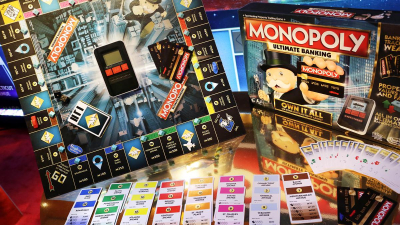What is the patent for the game Monopoly?

On December 31,1935, American game designer Charles Darrow received a patent for the now ubiquitous Monopoly board game. While Darrow has long been credited with the invention of one of the world's most popular board games, he was merely borrowing ideas from another American game designer Elizabeth Magie in reality.
Did you play board games during this vacation? While they are no longer as popular now in an uber-connected world as they used to be, board games continue to be one of the best means of offline entertainment. They not only get friends and families to sit across a table and have a jolly time, but also ensure that there is some takeaway, especially for the younger players.
Played by millions
Most board games are, in fact, designed with some element of learning along the way. If you think about the board games that you've played and liked, you might be able to realise what you took away from it as well.One of the most popular board games of all time is probably Monopoly. A game of competition, capitalism, and business strategy, Monopoly has been a bestseller for decades. Played by millions of people in over 100 countries across the world, it has been translated into many languages in order to produce localised editions.
The origin story
For many decades, the origin story of Monopoly was as popular as the game itself. This story talks about an American game designer Charles Darrow, who, being unemployed during the Great Depression, came up with the idea of Monopoly in the 1930s. He set about making a home-made version of this game and sold them for $4.
When he could no longer keep up with the demand in 1934, Darrow wrote to American toy and game manufacturers Parker Brothers, asking them to make it instead. While they initially shot it down, they bought the rights to the game in return for loyalties after hearing about the massive orders over the Christmas season. The jobless Darrow - who had received the patent for his Monopoly game on December 31, 1935 - ended up as a millionaire, giving the story a near-perfect ending.
Goes back even further
Even though most of what is mentioned in this story is true, it doesn't suffice, especially as an origin story. This is because the roots of the game don't just stop at Darrow and the 1930s, but in fact go back even further. It was a woman by the name Elizabeth Magie, more popularly known as Lizzie Magie, who laid down the basics of this beautiful game. Born in 1866, Magie was exposed to journalism at a young age thanks to her father, James Magie, being a newspaper publisher. The idea of the Monopoly game started taking shape after her father shared his copy of American political economist and journalist Henry George's best-selling book Progress and Poverty with her. James, an anti-monopolist, drew from the theories of George and was able to inspire his daughter.
The Landlord's Game
Magie worked as a stenographer in the early 1880s and pursued her literary ambitions in the evenings. She also spent a lot of time thinking about creating a game that would convey the ideas of George. Magie applied for a patent for her game-the Landlord's Game - in 1903 and received it on January 5, 1904.
Magie had designed her game as a kind of protest against the monopolists of her time. In fact, she had two sets of rules for the game. While one of them created an anti-monopolist set that rewarded everyone with the creation of wealth, the other was a monopolist set where the players were encouraged to crush each other and create monopolies. She created this binary approach as a teaching tool to enable players to realise that the anti-monopolist way was morally superior.
Uncovered by accident
And yet, it was the monopolist version that caught the imagination of the people, with a version of it surviving to this day. It was one such version that Darrow too had played while visiting a friend of his late in 1932. Darrow freely borrowed from Magie's core ideas and created his own version, which he went on to sell to the Parker Brothers.
Magie's role in the invention of Monopoly was uncovered by chance when Ralph Anspach, an economics professor, began a long legal battle against Parker Brothers in the 1970s. Until then, Magie's contributions were either lost to history, or maybe even intentionally omitted. Even now, nearly half a century later, Darrow's name is more often associated with Monopoly than Magie's.
Picture Credit : Google